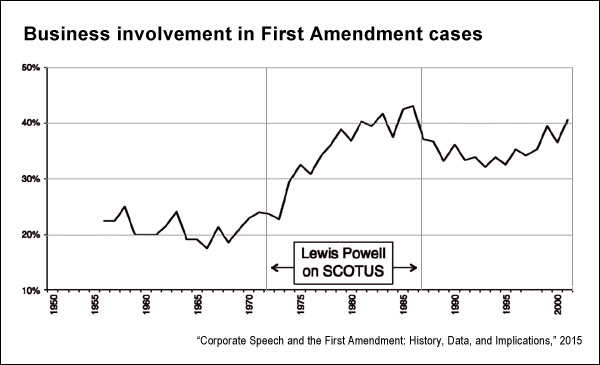The 2010 Supreme Court case Citizens United v. Federal Election Commission has been portrayed by supporters and critics alike as a watershed in the history of campaign finance and free speech in the United States. The decision explicitly freed corporations to spend unlimited sums on “electioneering communication” intended to help elect or defeat specific candidates. Justice Anthony Kennedy, writing for the majority, wrote that the ruling would enable political speech that is “central to the First Amendment’s meaning and purpose.” In his dissent, Justice John Paul Stevens argued that the ruling would allow wealthy corporations to “unfairly influence” the electoral process by marginalizing the speech of less-powerful individuals and groups.
Whatever one’s position on Citizens United, there is no question that its impact has been substantial: The Center for Responsive Politics indicated that super PACs created in the wake of the ruling spent more than $600 million during the 2012 election cycle. Research from the National Conference of State Legislators in 2011 indicated that 24 states had laws affected by the ruling — ones that banned political activity by unions, corporations or both. A 2014 report from the Brennan Center for Justice of New York State University, “After Citizen United: The Story of the States,” explores the impact that case has had in state and local elections.
A 2015 working paper from Harvard Law School, “Corporate Speech and the First Amendment: History, Data and Implications,” indicates that Citizens United, while certainly important, is only the latest in a series of cases that have expanded corporate use of the First Amendment. In his research, the author, John C. Coates IV, performed an analysis of nearly 13,000 Supreme Court decisions from 1946 to December 2014. Of these, 423 were selected that involved freedom of speech, press or assembly covered by the First Amendment. Cases were coded according to the nature of the plaintiff — companies, individuals, government entities, or others — and which party won. “Victories were distinguished between those in which a party defeated an attempt to persuade the Court to strike down a law or regulation under the First Amendment and those in which a party succeeded in so persuading a Court to strike down a law or regulation,” Coates writes.
The study’s key findings include:
- While the First Amendment was intended to protect individual freedom of religion, speech and assembly, as well as a free press, corporations have begun to displace individuals as its direct beneficiaries. This “shift from individual to business First Amendment cases is recent but accelerating.”
- Over time the high court has shown an increasing willingness to rule in favor of corporate interests, as a result “reducing law’s predictability, impairing property rights, and increasing the share of the economy devoted to rent-seeking rather than productive activity.”
- Business involvement in First Amendment cases more than doubled during the tenure of Lewis Powell Jr. on the Supreme Court. Before, no more than 25% of such cases involved corporations; toward the end, more than 40% did. (In 1971, prior to being named to the Court, he authored what is now known as the “Powell Memorandum” urging corporations to become more involved in politics and the law.)
- The turning point came with the 1976 case Virginia State Board of Pharmacy v. Virginia Citizens Consumer Council, which prohibited states from limiting the right of pharmacists to provide information on prescription drug prices. After the case, the average number of Supreme Court cases involving corporate interests rose from 1.5 to 2.2 per year (up 47%), while those involving individuals fell from 4.3 to 3.6 (down 12%). The “win” rate for businesses significantly increased as well, from an average of 20% to 55%.
- The First National Bank of Boston v. Bellotti (1978), which challenged a Massachusetts law prohibiting corporate donations on ballot initiatives unless its interests were directly involved, was the first that “affirmed in the strongest terms a corporate ‘right’ to free expression.” This was “founded in the simple logic that corporations were (legally) people, and people have rights under the First Amendment.”
- The 1980 case Central Hudson Gas & Electric Corp. v. Public Service Commission of New York, which struck down a law banning an electric utility from advertising to promote the use of electricity, marked another shift. The ruling “has encouraged an increasing number of commercial-speech cases to be brought over time,” and most “do not involve expressive businesses, but are attacks on laws and regulations that inhibit ‘speech’ by other kinds of businesses in areas of activity incidental or instrumental to their core profit-making activity.”
- The number of cases citing Central Hudson has climbed significantly over time. From 1980 to 1984, only 50 cases cited it; from 2010 to 2014, 79 did.
- The influence of Central Hudson is clear in POM Wonderful LLC v. Coca-Cola Co., decided in 2014. Health claims for a beverage were required by law to be substantiated by “competent and reliable scientific evidence” — ideally two randomly controlled trial (RCT) studies — or qualifying language had to be included in advertising. The corporation sued and won, and the ruling substantially reduced this requirement: “Regulatory agencies under Central Hudson [thus] face a strong risk that a court will be able to exploit any mismatch between the court’s (often uneducated or even ignorant) view of what is ‘necessary’ to accomplish the agency’s goals to strike down a regulation.”
- The ability for corporations to obtain relief from the courts gives them incentive to “place bets not on new technologies or marketing strategies, but on legal and political ‘innovation’” to protect markets they have and exclude new entrants. This also has the effect of causing regulatory agencies to reduce their efforts, because enforcing existing laws becomes increasingly difficult.
“These findings present a challenge to the view, articulated by the majority and concurrences in Citizens United and Hobby Lobby, that corporations and other business entities should be understood ‘simply’ as aggregations or associations of individuals, and so should not be distinguished from them for purposes of First Amendment analysis,” the author writes in his conclusion, continuing: “The corporate takeover of the First Amendment represents a pure redistribution of power over law with no efficiency gain — ‘rent seeking’ in economic jargon. That power is taken from ordinary individuals with identities and interests as voters, owners and employees, and transferred to corporate bureaucrats pursuing narrowly framed goals with other people’s money. This is as radical a break from Anglo-American business and legal traditions as one could find in U.S. history.”
Related research: A 2014 study published in Perspectives on Politics, “Testing Theories of American Politics: Elites, Interest Groups, and Average Citizens,” analyzes the relative influence of political actors on policymaking. The researchers sought to better understand the impact of elites, interest groups and voters on the passing of public policies. The authors, Martin Gilens of Princeton and Benjamin Page of Northwestern University, found that compared to economic elites, average voters have a low to nonexistent influence on public policies. “Not only do ordinary citizens not have uniquely substantial power over policy decisions, they have little or no independent influence on policy at all.” In cases where citizens obtained their desired policy outcome, it was in fact due to the influence of elites rather than the citizens themselves.
Keywords: First Amendment, corporations, Court of Appeals, Virginia Pharmacy, Bellotti, Central Hudson, Citizens United, Hobby Lobby, lobbying, rent-seeking



Expert Commentary